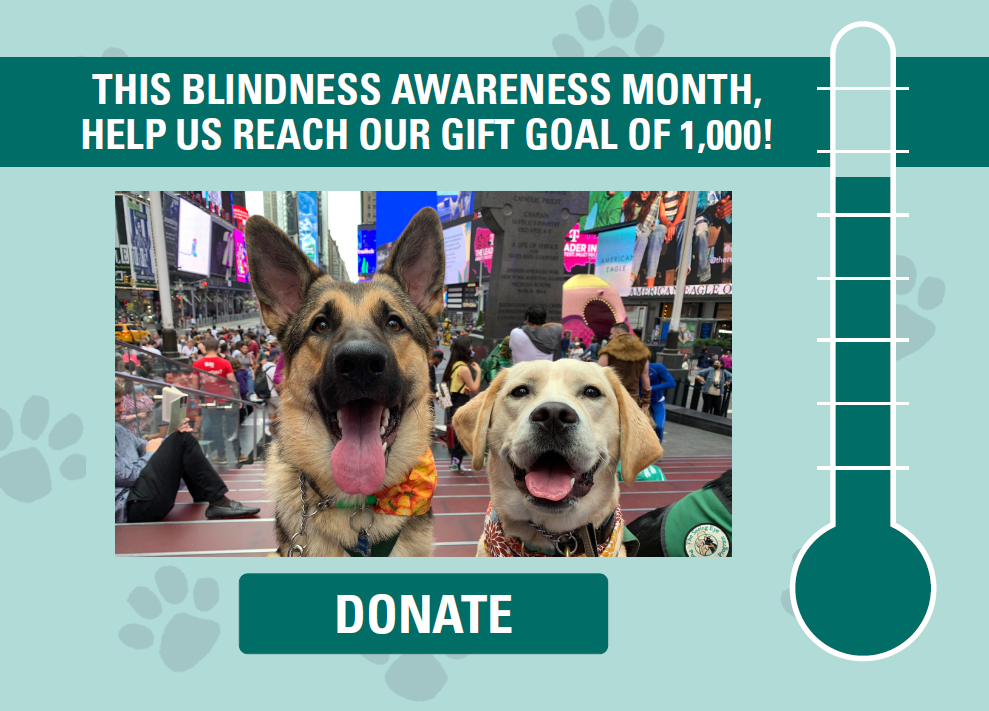Admissions
Frequently Asked Questions
Frequently Asked Questions
Do I have to be blind to apply for a Seeing Eye dog?
No, but your remaining vision needs to be evaluated to see if you are an appropriate candidate. For the safety of the team, people with some vision must not let their vision interfere with the dog’s work. Each person is evaluated on an individual basis when considering admission.
How long do I have to wait for a class date?
Wait time is contingent on a number of factors. Keep in mind that class confirmation is dependent upon having the right dog to match with you, not just when we have room in a class.
Is it okay if I have a pet dog or cat at home?
Yes. Many of our dogs are raised in households with cats, dogs and other pets.
Do I need Orientation and Mobility (O&M) training?
We require O&M training. Our experience indicates that the more experience you have with independent travel, the higher the chance for success with your dog.
What are The Seeing Eye facilities like?
The main campus is about 2 miles from the center of Morristown. Student accommodations are single rooms with private baths. Each room has a double bed, a telephone, Amazon Echo Dot, safe, mini-fridge, and wireless Internet access. There is a fitness center, indoor and outdoor grooming facilities, a free-run area, laundry facilities, a leisure path, student lounges, student library, and outside patio.
What can I expect during my stay at The Seeing Eye?
New students stay on campus for 3-½ weeks; students who are here for their second or subsequent Seeing Eye dog stay for 2-½ weeks. Students arrive on a Monday and spend the first few days getting acquainted with the surroundings and their instructors. Students are matched with their dogs on Wednesday morning. Days begin at 5:30 a.m., breakfast is at 7 a.m., lunch at 12:15 p.m., and dinner at 5:15 p.m. Each student goes on two trips per day; one in the morning, one in the afternoon. There is time in between trips for laundry, relaxing and socializing. Lectures take place after dinner. Instruction begins with short, simple routes in downtown Morristown, progressing to longer, more varied routes. In the last week of class, students have an opportunity to take a trip to New York City.
I have had guide dogs from other schools but not yet from The Seeing Eye. How long would I have to be in class?
We always advise students from other schools to prepare for the full 3-½ week stay. The actual decision regarding date of departure is made while in class, once we can evaluate how both the dog and the student are doing.
Is there a graduation ceremony?
No, we do not have a graduation ceremony. As a matter of policy, The Seeing Eye has never wished to draw attention to this transition from a ceremonial point of view. Instead, the emphasis is focused on continuing to build and strengthen the relationship, which is still in its infancy. While the formal instructional program is over, there is much work ahead for this newly formed team. Stepping out, introducing a young dog to new surroundings, new friends, family and co-workers serves to reinforce all that the two have learned over the past several weeks.
Are follow up services available?
Seeing Eye staff members are always available for telephone consultations as well as visiting graduates in their homes to help refine training techniques or answer any questions that may come up as dog guide users.
How much does a Seeing Eye dog cost?
Students pay $150 for their first dog and $50 for each successor dog. Veterans of the military pay $1. Payments may be made in installments after students leave the school. A fraction of the total cost to create a match between person and dog, this fee reflects the student’s commitment to enhanced independence.
Do Seeing Eye graduates own their dogs, or does the school retain ownership?
Following a student’s successful graduation from the training programs required by The Seeing Eye, the graduated student:
- is granted full ownership rights over his or her Seeing Eye dog, and
- assumes full responsibility for the obligations and risks associated with ownership of his or her Seeing Eye dog, including the obligation to properly feed, shelter, and care for his or her Seeing Eye dog.
The Seeing Eye retains ownership of the harness and requires that harnesses be returned to the school upon retirement of any Seeing Eye dog.
In the rare instances that The Seeing Eye becomes aware of allegations of abuse after a graduated student has assumed ownership responsibility of his or her Seeing Eye dog, The Seeing Eye contacts the graduated student and may further assess the allegations. In the event that animal abuse or neglect is proven, The Seeing Eye defers to local enforcement authorities, including local humane societies, who generally possess the legal authority to remove the animal from the abusive environment.
Does the school allow communication between a graduate and the family that cared for the dog as a puppy?
We do not facilitate direct communication between graduates and their dog’s puppy raisers. Many graduates write letters to their puppy raisers, and The Seeing Eye serves as intermediary to forward communications between the parties. However, we discourage any direct communication between graduate and puppy raiser. We strongly believe this policy is in the best interest of the emotional health of all involved: the graduate, the puppy raiser, AND the dog.
If you still have questions, please call our Admissions Department at 973-539-4425 or email admissions@seeingeye.org.
